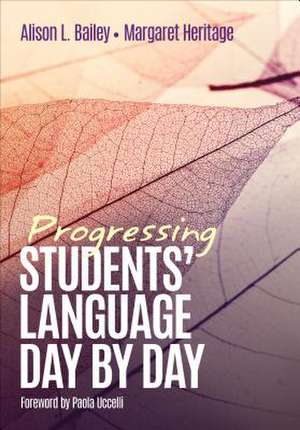Progressing Students' Language Day by Day
Autor Alison L. Bailey, Margaret Heritageen Limba Engleză Paperback – 5 feb 2019
Preț: 127.09 lei
Nou
24.32€ • 26.41$ • 20.43£
Carte disponibilă
Livrare economică 01-15 aprilie
Livrare express 18-22 martie pentru 31.92 lei
Specificații
ISBN-10: 1506358837
Pagini: 240
Dimensiuni: 178 x 254 x 19 mm
Greutate: 0.5 kg
Ediția:1
Editura: SAGE Publications
Colecția Corwin
Locul publicării:Thousand Oaks, United States
Recenzii
"I see the need most immediately when teachers tell me standards-based assessments don’t reflect what they know their students know. What they are really saying is their students lack the language skills to provide rigorous, academic explanations of their knowledge. As a former science teacher, I could not be satisfied with watching a student engage in a lab activity. They also needed the scientific language skills to explain what they had done and what their results were. Guessing that they understood the concepts while failing to nourish and build their scientific language skills meant I was only doing half my job.
"The DLLP provides the tools to dig in and understand where students are in terms of their specific language development, and gives insight to every teacher on how to support and build those skills. The progressions are clear and intuitive, you don’t need to be a linguistics expert to work with them. In my role as a program developer the DLLP has been a game changer, giving ME a language and a skill I can support and nurture in all the teachers I work with."
"Despite the importance of language development for English Learner (EL) school success, teachers have surprisingly few research-based tools that enable them to observe and guide the language development process as it unfolds. This book provides “Dynamic Language Learning Progressions” that serve as a clear and easy-to-use framework for maximizing language learning and promoting formative progress monitoring in classrooms. WIDA is thrilled to have sponsored this ground-breaking work."
"While teaching academic core content is what teachers focus on, teaching the language of the content to support English learners is a challenge. Alison Bailey, Margaret Heritage and colleagues skillfully weave these two together. They provide strategies for teachers to not only make the content language accessible to students, but also to demonstrate how to assess students’ ability to explain the content being taught through the DLLP. Teachers at Hope Online Learning Academy have begun implementing the DLLP. One teacher commented, “When I started applying more language strategies to whole group instruction, I noticed a difference in my students' oral language progressions.” The DLLP strategies in Progressing Language Day-by-Day will benefit all teachers who work with English learners."
"Progressing Students’ Language Learning Day by Day is a practical guidebook which should be on every teacher’s bookshelf, dog-eared because of its valuable content and easy to implement style. The language development structures are applicable to all grade levels and all subjects areas especially since all of our classrooms are language development classrooms."
"Formative assessment and analyzing student work can help teachers to better target their instruction of students. The Dynamic Language Learning Progression (DLLP) approach to making use of formative assessments and for planning and implementing instruction across the content areas explored in Bailey and Heritage's work will help all teachers to better meet the needs of the diverse learners, not only the English learners acquiring English as an additional language in their classrooms."
Cuprins
Preface
Acknowledgments
About the Authors
About the Contributors
PART I. LAYING THE GROUNDWORK
Chapter 1. Definitions and Contexts
Chapter 2. What Is the DLLP Approach?
Appendix 2A: Research Methods and Protocols
Appendix 2B: Directions for Teachers’ Tool for Documenting Language Features in the Classroom for Formative Purposes
Chapter 3. Formative Assessment
PART II. FEATURES OF THE DLLP APPROACH
Chapter 4. Word Features of the DLLP Approach
Appendix 4A: Practice Finding the “Best Fit” on Sophistication of Topic-Related Vocabulary
Appendix 4B: Student Self-Assessment DLLP Graphic
Appendix 4C: Practice Finding the “Best Fit” on Sophistication of Verb Forms
Appendix 4D: Practice Finding the “Best Fit” on Expansion of Word Groups
Chapter 5. Sentence Features of the DLLP Approach
Appendix 5A: Practice Finding the “Best Fit” on Sophistication of Sentence Structure
Chapter 6. Discourse Features of the DLLP Approach
Appendix 6A: Practice Finding the “Best Fit” on Coherence/Cohesion
Appendix 6B: Discourse Connector Lists
Appendix 6C: Practice Finding the “Best Fit” on Establishment of Advanced Relationships Between Ideas
Appendix 6D: Practice Finding the “Best Fit” on Stamina
Appendix 6E: Practice Finding the “Best Fit” on Perspective-Taking
Appendix 6F: Written Language Features of the DLLP Approach
PART III. LEADING LANGUAGE AND CONTENT LEARNING
Chapter 7. Leadership and Communities of Practice to Support DLLP Implementation
Appendix 7A: Agendas for Communities of Practice
Index
Notă biografică
Alison L. Bailey is Professor of Human Development and Psychology at the University of California, Los Angeles, working on issues germane to children¿s linguistic, social, and educational development. She has published widely in these areas, most recently in Annual Review of Applied Linguistics, Teachers College Record, Educational Researcher, and Review of Research in Education. Her previous books with Margaret Heritage include Formative Assessment for Literacy, Grades K-6 (Corwin Press) and Self-Regulation in Learning: The Role of Language and Formative Assessment (Harvard Education Press). Other recent books include Children¿s Multilingual Development and Education: Fostering linguistic resources in home and school contexts (Cambridge University Press), and Language, Literacy and Learning in the STEM Disciplines: How language counts for English Learners (Routledge Publishers). She serves as a member of the National Assessment of Educational Progress (NAEP) Standing Committee on Reading, the National Council on Measurement in Education (NCME) Task Force on Classroom Assessment, and the National Academy of Sciences¿ Consensus Committee on English Learners in the STEM Disciplines.
